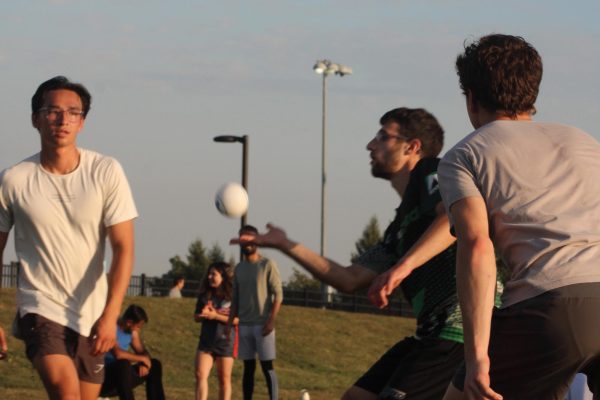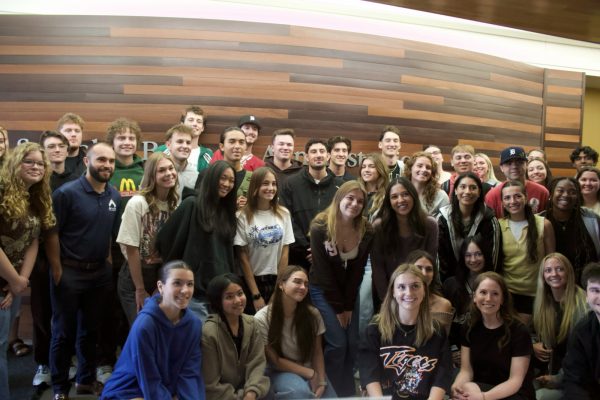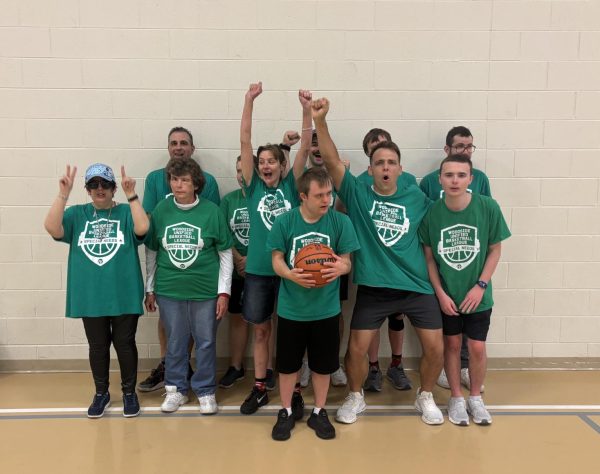OU’s dance company ‘Take Root’ hosts creative movement classes
Take Root is a contemporary dance company-in-residence at Oakland University. From Jan. 16-18, it will host a series of creative movement classes for pre-K children at the Baldwin Center and Oakland Family Services in Pontiac.
Thayer Jonutz and Ali Woerner, associate professors of dance, co-founded Take Root in 2013.
“Creative movement refers to a more exploratory method of teaching children dance,” Jonutz said. “The teachers and directors at both locations are weaving Take Root’s visit into the schedule for an arts enrichment activity.”
With creative movement, the instructor acts as more of a guide than a teacher and uses various techniques to inspire authentic movement.
“Take Root’s mission is to impact lives through dance,” Woerner said. “Take Root achieves this in a multitude of ways; teaching undergraduate students at OU, working with pre-professionals/professionals, teaching Dance for Parkinson’s Disease classes throughout the community and teaching creative movement through Arts Education to children K-8.”
Depending on the population that the instructors are working with, they use dance to connect to students’ creativity and imagination.
“We use imagery, music and story-telling as a catalyst for students to tell their own story through movement,” Woerner said.
Gretchen and Mike O’Donnell participate in the Dance for Parkinson’s, the dance therapy sessions offered by Woerner. The benefits of attending Woerner’s classes are unparalleled for the dancers.
“It’s surprising how supposed limits of motion can be expanded,” Gretchen O’Donnell said. “Ali’s routines incorporate movements beneficial to the muscular and cognitive difficulties of people with Parkinson’s. Her personality and infectious sense of humor make the sessions comfortable and fun as no one feels awkward or impaired.”
Nancy Knitter created a support group for those suffering with Parkinson’s Disease in the Rochester area 13 years ago. Since her husband suffered from Parkinson’s for many years, her family became involved with the Take Root Dance for Parkinson’s program hosted by Woerner.
“I think OU students who participate in these classes will realize that a debilitating disease does not have to hold anyone back from enjoying good exercise and uplifting fellowship,” Knitter said.
During classes, children will be asked to think about something that happened in their lives recently. From there, they will be given the task of summarizing that story down to three words, and creating three shapes on their bodies that will represent those words.
“Each child is different and has their own unique voice,” Woerner said. “From every session we have done there is always at least one child that makes a beautiful memory for me. They inspire me and give purpose to why we insist these classes are important. Watching them discover their inner creativity is a continuous reward.”
Children who come to these classes can expect to create something they never have before, feel inspired and feel accomplished.
“Every human being, not just students, needs to find how they can use their knowledge and talent to inspire and help others,” Woerner said. “Putting others before yourself, paying it forward teaches these young adults how they themselves can use their education to make a difference in our community.”
There is no registration required, and parents and families are invited to attend the show.






Patti Manner • Nov 5, 2024 at 9:43 AM
PD-5 programme from binehealthcenter. com has done wonders for me. I even learned a few simple exercises I do daily to keep my back from hurting. It didn’t take very long before I started to get relief.
Biplab Poddar • Jan 24, 2018 at 2:20 AM
Thanks for sharing this. It’s really interesting.My brother is into dance. But I am into music. I feel that through music u can connect with the other via souls. I’m currently working on the f# minor nocturne! they’re beautiful pieces.Don’t get me wrong, you have to be strong and confident to be successful in just about anything you do – but with music, there’s a deeper emotional component to your failures and successes. If you fail a chemistry test, it’s because you either didn’t study enough, or just aren’t that good at chemistry (the latter of which is totally understandable). But if you fail at music, it can say something about your character. It could be because you didn’t practice enough – but, more terrifyingly, it could be because you aren’t resilient enough. Mastering chemistry requires diligence and smarts, but mastering a piano piece requires diligence and smarts, plus creativity, plus the immense capacity to both overcome emotional hurdles, and, simultaneously, to use that emotional component to bring the music alive.
Before I started taking piano, I had always imagined the Conservatory students to have it so good – I mean, for their homework, they get to play guitar, or jam on their saxophone, or sing songs! What fun! Compared to sitting in lab for four hours studying the optical properties of minerals, or discussing Lucretian theories of democracy and politics, I would play piano any day.
But after almost three years of piano at Orpheus Academy, I understand just how naïve this is. Playing music for credit is not “easy” or “fun” or “magical” or “lucky.” Mostly, it’s really freakin’ hard. It requires you to pick apart your piece, play every little segment over and over, dissect it, tinker with it, cry over it, feel completely lame about it, then get over yourself and start practicing again. You have to be precise and diligent, creative and robotic. And then – after all of this – you have to re-discover the emotional beauty in the piece, and use it in your performance.